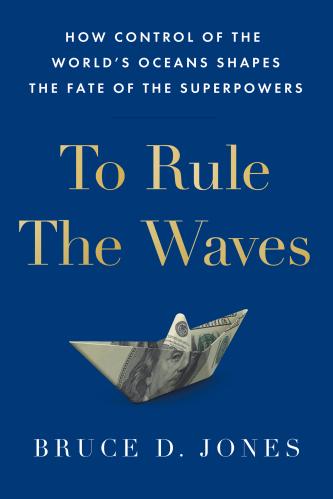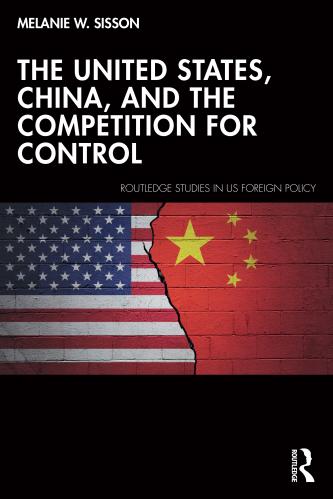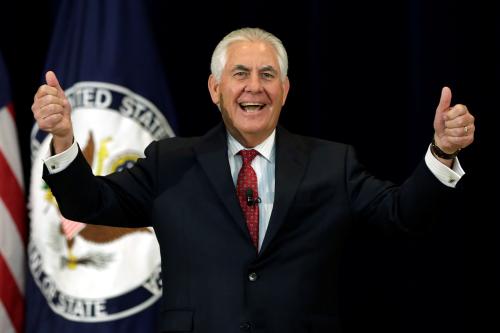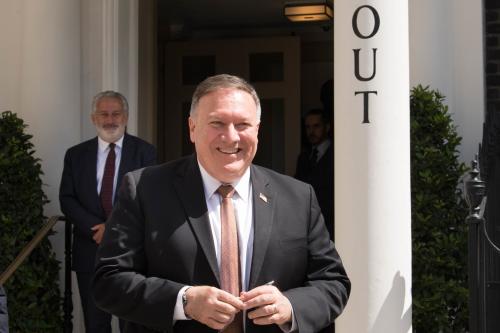Proposing how to restore the State Department after the vandalism of the Trump years has become a cottage industry in foreign policy circles. But one idea in circulation — an “amnesty” to permit foreign service officers (FSOs) who retired or resigned since 2016 to rejoin the active ranks — is counterproductive and should be dropped.
Such an amnesty can weaken the foreign service by clogging the trajectory of officers who endured the last four years. Many worked quietly but heroically, in an environment of suspicion and hostility, to preserve aspects of effective U.S. diplomacy. The more senior jobs they would expect to fill next might go to “amnestied” FSOs instead. Even in normal times, upward mobility for the best of current FSOs can stall, with the number of senior FSOs restricted by Congress and the career pyramid narrowing considerably as it approaches the top. If returnees monopolize the authorized staffing numbers in the ranks they resume holding, new hires might be stuck in entry-level jobs for years: Each ex-FSO who re-enters active service reduces the jobs available for recent hires, complicating recruitment and retention of new and recent hires. This would be especially devastating for diversity, since the service already faces disproportionate attrition among minority and female officers. (Imagine what “recalls,” if applied to retired military officers, would do to promotion prospects for those in active military service. The impact within State would be similar.)
An amnesty would erode team cohesion. Not every FSO who left since 2016 was a star. Those whose post-State career plans failed to materialize may embrace an amnesty, but not all will have the skills needed today. Rehired FSOs may have trouble relating to colleagues with uninterrupted service. In the case of U.S. embassies that endure lengthy “ordered departures” (where so-called “non-emergency” staff are evacuated for security or other reasons), a division endures well past the end of the evacuation between those who remained (and typically “bonded” in what is usually a crisis situation) and those who left and then returned. Colleagues serving in the same embassy no longer enjoy the camaraderie of shared experiences. If many ex-FSOs returned under amnesty, these types of resentments and splits could mushroom to U.S. diplomatic installations globally.
Theoretically, an amnesty could repopulate depleted diplomatic ranks. In practice, this does not work. A great imbalance exists between the category of foreign service vacancies and the skill codes of those most likely to return under an amnesty. Excess vacancies tend to be concentrated in specialized fields such as Office Management Specialists or Diplomatic Security, not in the political, economic, or other skill codes of FSO generalists.
Fortunately, an amnesty is not necessary. If there are talented ex-FSOs whose service would be of immense importance, existing methods of re-hiring are preferable to a blanket amnesty. The State Department can draw upon Schedule C or B non-career recruitment to bring back former FSOs, for instance; the hiring process is streamlined, and such recruitments do not count against the number of FSO slots. In the case of retired, senior-level FSOs, State can selectively rehire via the recall authority permitted to the director general under the Foreign Service Act and codified in the Foreign Service Manual. Recall authority permits the State Department to bring back retired FSOs for specific positions.
These mechanisms put the State Department in charge of choosing whose return is desirable, without offering a general invitation to everyone who left since 2016. While these options do not restore the previous FSO career status these ex-employees once held, they allow key vacancies to be filled or specific skills to be sought, without gumming up foreign service recruitment and promotion. (For an FSO who left prior to retirement and is therefore not eligible for recall, and who was not invited back via Schedule C or B hiring, there are processes to apply for re-appointment, within five years of departure and contingent on whether there are shortages in the relevant rank and skill code.)
As Secretary-designate Antony Blinken and his team consider which former FSOs to bring back, they should also look to rebalance the power discrepancies between regional and functional bureau within the department. Regional bureaus dominate the assignment process (and performance in those assignments influence promotions). As a result of this and other features of the department, regional bureaus tend to weigh more heavily in, and sometimes even bulldoze, the policymaking process within the building. Yet the challenges to U.S. interests and values no longer fit neatly (if they ever did) into regional settings. Regional expertise is necessary but not sufficient when considering migration, the climate crisis, pandemics, weapons proliferation, the deterioration of democratic norms and human rights, promotion of U.S. economic and commercial interests, and other critical issues.
Yet too few FSOs view functional service as career-enhancing. This needs to change. The State Department should require demonstration of successful service in a functional bureau or functional post overseas at the mid-ranks (in addition to the entry-level consular tour already required for foreign service tenure) for any senior-level promotion and ambassadorial nominations. This change would immediately propel ambitious FSOs to compete for positions in functional bureaus, breaking them out of often repeated tours reporting on the minutiae of party politics in their country of assignment.
An “amnesty” for any ex-FSO will not revitalize America’s professional diplomacy.
Yes, the foreign service suffered under the Trump administration. But an “amnesty” for any ex-FSO will not revitalize America’s professional diplomacy in the ways most needed to meet contemporary challenges. In the short term, exceptional individuals who left the service and who have vital skills needed today can be re-hired through existing mechanisms. Over the longer term, the State Department should focus on how to recruit, train, retain, and promote diverse FSOs who demonstrate both regional and functional expertise. In today’s world, FSOs who are “climate hands” working multilaterally should be viewed as equally important as “China hands” working bilaterally.
The Brookings Institution is committed to quality, independence, and impact.
We are supported by a diverse array of funders. In line with our values and policies, each Brookings publication represents the sole views of its author(s).











Commentary
To rebuild the foreign service, avoid an “amnesty” and promote functional roles
December 28, 2020